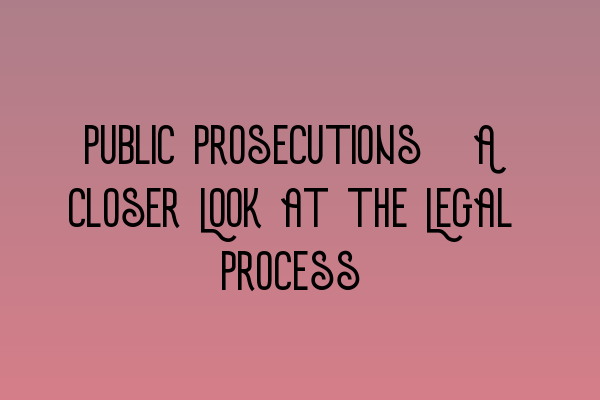Public Prosecutions: A Closer Look at the Legal Process
When it comes to criminal cases, one of the key players in the legal process is the Public Prosecution Service, also known as the Crown Prosecution Service (CPS) in England and Wales. The CPS is responsible for prosecuting individuals on behalf of the state for a wide range of criminal offenses, ensuring that justice is served and society is protected.
Role of the Public Prosecution Service
The primary goal of the Public Prosecution Service is to review evidence provided by the police and determine whether there is enough evidence to pursue a criminal case against an individual. This review process involves assessing the credibility and reliability of the evidence, considering any potential legal defenses, and determining the likelihood of securing a conviction.
Once a decision has been made to proceed with a prosecution, the CPS will gather further evidence, interview witnesses, and engage with the defense team to ensure a fair trial. The Public Prosecution Service acts as the advocate for the state, presenting the evidence against the accused and arguing for their guilt.
The Legal Process
The legal process begins with the investigation stage, where law enforcement agencies gather evidence to support a potential criminal case. If sufficient evidence is found, the case is passed to the Public Prosecution Service for review. During this stage, prosecutors carefully examine the evidence and make decisions based on the likelihood of securing a conviction in court. It is crucial to have well-trained prosecutors who have a deep understanding of the law and the responsibilities of their role.
Once the decision to prosecute is made, the case moves to the pre-trial stage. Here, the prosecution and defense teams exchange evidence and witness statements. This allows both sides to assess the strength of their case and explore possibilities for negotiation or plea bargains. A skilled prosecutor will know how to present the evidence effectively and negotiate with the defense, always keeping the best interests of justice in mind.
If no resolution is reached during the pre-trial stage, the case proceeds to trial. The prosecution presents their case, including witness testimonies, expert opinions, and any other evidence gathered during the investigation. The defense team then has the opportunity to challenge the prosecution’s case and present their own evidence and witnesses. This adversarial process ensures a fair and balanced examination of the evidence.
Throughout the trial, the prosecutor’s role is to present the case clearly, persuasively, and in adherence to the rules of evidence. They must demonstrate the guilt of the accused beyond a reasonable doubt, convincing the judge or jury of the defendant’s culpability. A skilled prosecutor will be well-versed in the law, possess strong oral advocacy skills, and have the ability to think on their feet.
Continuing Education and Training
Given the crucial role of prosecutors in the criminal justice system, continuous education and training are essential. As the legal landscape evolves, prosecutors must stay up to date with the latest legal developments and precedents. This ensures that they are equipped to handle complex cases, navigate legal challenges, and protect the interests of justice.
Law firms and legal training providers, such as SQE Criminal Law & Practice Law UK, offer a range of courses and preparatory materials to assist aspiring prosecutors in their career development. These resources, including the SQE 1 Practice Exam Questions and SQE 1 Practice Mocks FLK1 FLK2, are designed to improve legal knowledge, develop advocacy skills, and enhance overall understanding of the criminal justice system.
For individuals looking to qualify as prosecutors, the SQE 2 Preparation Courses and SQE 1 Preparation Courses provided by SQE Criminal Law & Practice Law UK are invaluable resources. These courses cover essential legal topics, procedural aspects, and practical skills required for successful legal practice. By enrolling in these courses, aspiring prosecutors can gain the necessary knowledge and confidence to navigate the intricacies of the legal process.
Conclusion
The Public Prosecution Service plays a crucial role in the criminal justice system, ensuring that justice is served and society is protected. By carefully reviewing evidence, making informed decisions, and skillfully presenting the case in court, the prosecution seeks to uphold the principles of justice and fairness. Aspiring prosecutors can benefit from the comprehensive training and educational resources available at SQE Criminal Law & Practice Law UK, allowing them to develop the necessary skills and knowledge to excel in this challenging profession.
For more information about qualifying as a prosecutor and the SRA SQE exam dates, visit SRA SQE Exam Dates.
